Combatting waterborne diseases
Following a natural disaster, population displacement or a war, the lack of drinking water and inadequate sanitary conditions – often aggravated by overcrowding – can generate considerable risks to health and for the survival of those injured. Working among those most prone to disease caused by unsafe drinking water and an unsanitary environment, SOLIDARITÉS INTERNATIONAL helps to fight water-related diseases that kill over 2.6 million people every year.
Providing access to drinking water
2.5%
of water on Earth
is freshwater¹
2.6
million people die
every year of
water-related diseases
29%
of the planet drinks
unsafe water
2.4
billion people will live
in water-stressed
countries in 2023²
Thanks to the water that I collect every morning from the well built by SOLIDARITÉS INTERNATIONAL, my mother can now cook and we can drink safe water every day. Because water is life.
Charlène (8) – Central African Republic
When a crisis occurs, the need for drinking water becomes obvious within the very first few hours. Because it is extremely difficult to mobilize large quantities of drinking water for thousands of people in some of the world’s most remote and dangerous areas, SOLIDARITÉS INTERNATIONAL uses a range of technologies appropriate to the situation in question.
Water trucking is often the first solution when it comes to supplying drinking water. This involves transporting water by tankers (lorries or vessels) from a source to a distribution site. Disinfected by chlorination while transported, the water is then delivered to a storage point connected to taps that are used by the community.
A surface water treatment system (SWaT) comprises one or more pumps that collect the surface water, whether from a river, a lake or a pond. It then undergoes coagulation, flocculation and chlorination treatment before being distributed.
Building and rehabilitating wells and boreholes is a more sustainable solution, as is creating water networks, considered appropriate when there are large numbers of people to supply.
If centralizing water treatment is not efficient or appropriate, families in need will be given individual filters (ceramic, by ultrafiltration, or by activated charcoal) or disinfection products (chlorinated products).
Providing access to sanitation
272
million schooldays
are missed for
lack of toilets
946
million people defecate
in the open air
1.8
billion people drink
water contaminated
by faecal matter
Non-medical associations involved in providing emergency sanitation and hygiene access can play a pivotal role alongside medical NGOs in the fight against water-borne diseases.
Dr Guillaume Le Loup, Doctor of Science and a Science Po Paris graduate.
When combatting water-borne diseases, sanitation services are as important and urgent as access to drinking water and hygiene.
From the very first few days of a crisis, it may be necessary to collect the excrement left in the open air by those affected. At the same time, when building community latrines, controlled defecation areas – in secure locations – can also be set up.
WASTE MANAGEMENT TO PREVENT EPIDEMICS
Once latrines have been built (pit latrines or cesspools, raised or un-raised depending on the environmental and cultural conditions), SOLIDARITÉS INTERNATIONAL puts a management and cleaning system in place. Depending on the length of the crisis, drainage and fecal sludge and wastewater treatment systems are planned out and implemented.
Excrement treatment can be carried out using one or a series of techniques, including anaerobic baffled reactors, lagoons, sedimentation and thickening ponds, drying beds, composting, anaerobic biogas reactors, disinfection, etc.
Sanitation is also about managing solid waste by using landfill and controlled incineration, and sometimes recycling if conditions allow. Lastly, rainwater and water point drainage is important in order to prevent flooding and stagnant water.
Improving hygiene conditions
50%
of risks of diarrhoea
are mitigated with
the use of soap
15
litres of water per
person per day =
the average consumption
in Sub-Saharan Africa
1,000
children under 5
die every year of
simple diarrhoea
88%
of cases of diarrhoea can be
attributed to unsafe water or
inadequate sanitation and hygiene
The absence of sanitation facilities constitutes one of the world’s principal causes behind girls dropping out of school. Millions of them do not dare go to school once they start their period.
272 million school days are lost each year because of the lack of toilets..
Anne-Lise Lavaur, Program Quality and Technical Department Manager
Building water and sanitation supply infrastructures (water points, toilets) is not sufficient. Those hit by a crisis also need to know how to use the services they can access, which are generally different to those that they used prior to the crisis. To ensure that the services implemented are of good quality and sustainable, it is vital that their use is regulated, and training given to those who will be using them.
It is also imperative that they are issued with all necessary day-to-day items required for personal hygiene, such as water containers (buckets), washing and cleaning soap, and menstrual hygiene products for women.
increase awareness, a priority for the humanitarian effort
To prevent epidemics, it is also essential to identify high-risk hygiene practices and to teach poeple how to change them, by scheduling messages and communication methods that are appropriate for the local culture and the emergency situation concerned. SOLIDARITÉS INTERNATIONAL uses methodologies tried and tested at international level, which are based on an anthropological and participative approach, and adapts them to suit the situation on the ground. These methodologies harness individual and group meeting techniques, theatre stages, fun activities in schools, promotional campaigns using images or posters on site, and messages communicated via the media.
Sources figures:
¹CIEau
²Goal 6 | Department of Economic and Social Affairs
Should you have any questions, please contact Xavier Lauth

Publications
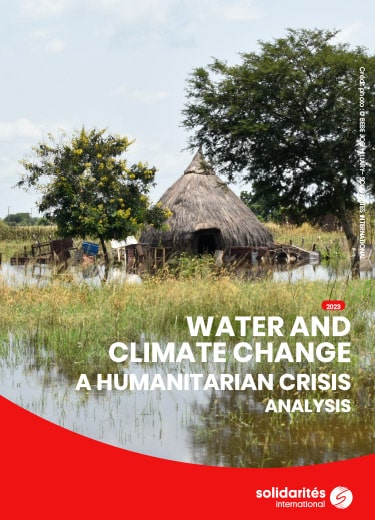
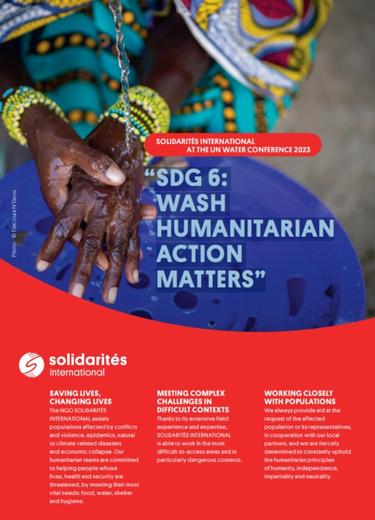
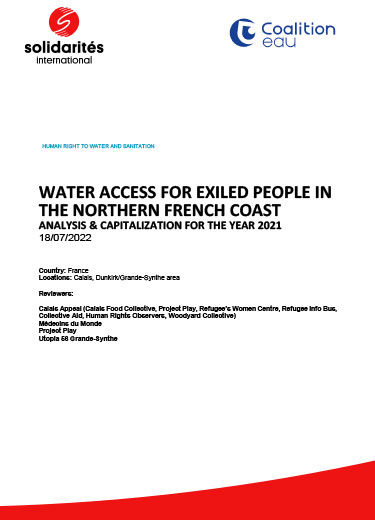
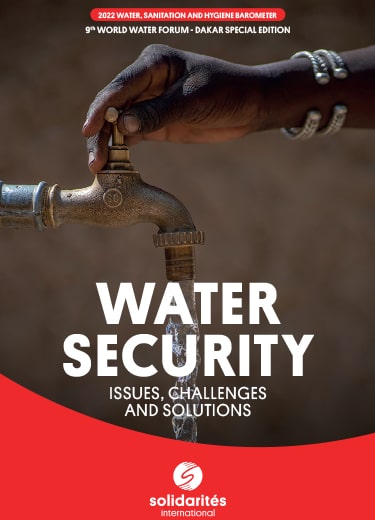
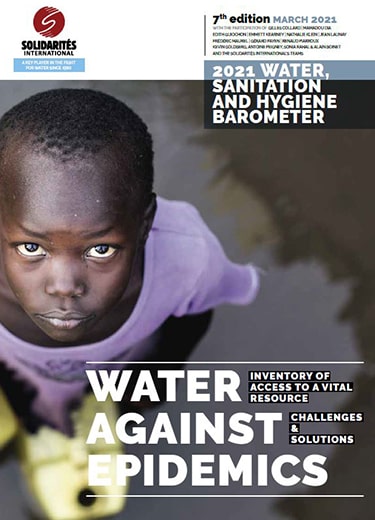

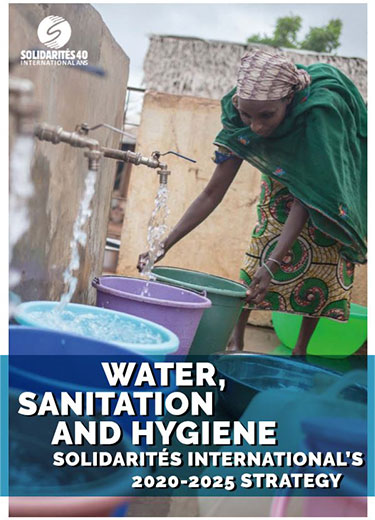
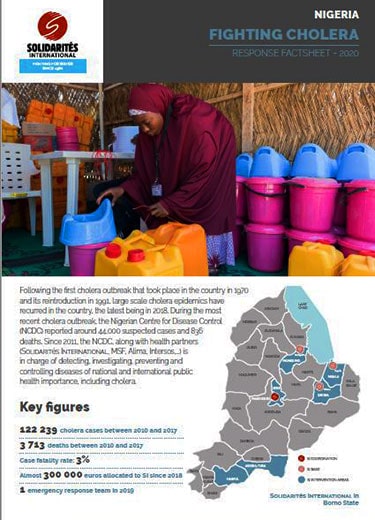
Vacancies
At head office
Worldwide
Internships
